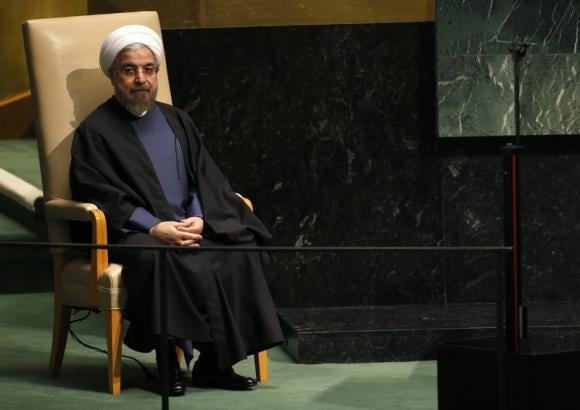(Reuters) -
Iranian President Hassan Rouhani has dispatched his brother and atomic
chief to Geneva to try to overcome hurdles in high-profile nuclear talks
with the United States and five other major powers, official Iranian
media reported on Saturday. U.S. Secretary of
State John Kerry said on his way to meet his Iranian counterpart
Mohammad Javad Zarif that Washington wanted an agreement by the deadline
of June 30. U.S. and
Iranian officials began a new round of talks in Geneva on Friday,
seeking to end a 12-year standoff over the Islamic Republic's nuclear
program, suspected by the West of harboring military aims - a charge
Tehran consistently denies. The
bilateral Tehran-Washington discussions, to culminate in a foreign
ministers' summit on Sunday, are part of wider bargaining between Iran
and six major powers - "P5+1" - aimed at restricting Iran's nuclear
activities in return for relief from global economic sanctions. Iran's negotiations with "P5+1" - the United States, Britain, France, Germany, Russia and China -
have already missed a November 2014 target date, and in the run-up to
the June 30 deadline, wide gaps apparently remain, mainly over Iranian
uranium enrichment and the pace of removing sanctions. Iranian
media said nuclear chief Ali Akbar Salehi and President Rouhani's
brother and close aide, Hossein Fereydoon, would make their first formal
appearance in the marathon talks, now entering a sensitive stage
involving fine technical details. "Fereydoon's
presence is prompted by the need to engage in consultations and make
necessary coordinations throughout the present round of talks in
Geneva," foreign ministry official Mohammad Ali Hosseini said. "Today
Geneva is the epicenter of U.S.-Iranian diplomacy over the remaining
nuclear issues," he was quoted as saying by state news agency IRNA. Also
taking part in the talks is the U.S Secretary of Energy, Ernest Moniz,
who held technical discussions with Salehi in Geneva on Saturday, IRNA
said. The semi-official
Tabnak newspaper said Moniz and Salehi had known one another since the
early 1970s, when Iran's now nuclear chief studied nuclear engineering
at the Massachusetts Institute of Technology (MIT) where Moniz was
teaching. "Now they meet
again after more than 40 years. Moniz is joining the Geneva talks to
make sure the highly technical diplomacy proceeds with precision," said
Tabnak, quoting a nuclear official. A recent U.N. report said that Iran
has refrained from expanding tests of more efficient models of a machine
used to refine uranium under a nuclear agreement with six world powers.
Development of advanced centrifuges is feared to lead to material
potentially suitable for manufacture of nuclear bombs. Leading Iran
negotiator Abbas Araqchi told state television after the first days of
talks with the U.S. that the two sides "are in search of more creative
ways to speed up the talks". "The atmosphere was positive and in earnest," he said. "After
a year of negotiations over a wide range of topics, now we are about to
enter the fine details. Our goal is for the final accord to include the
general outlines and details all at once, so we will have to cram in
the deals in all areas and stages," he said.
Iran sends high-level negotiators to Geneva nuclear talks
















Comments About This Article
Please fill the fields below.